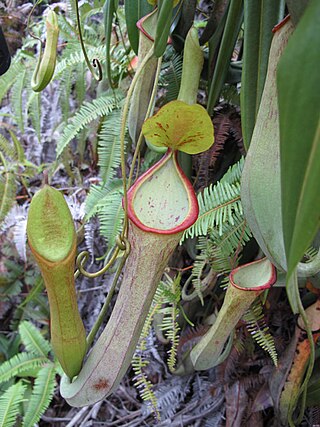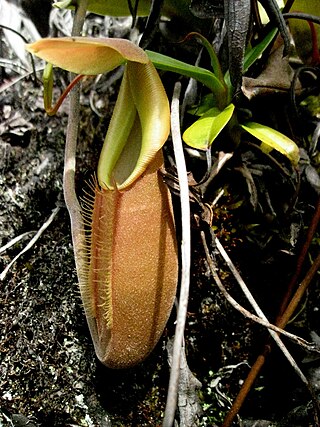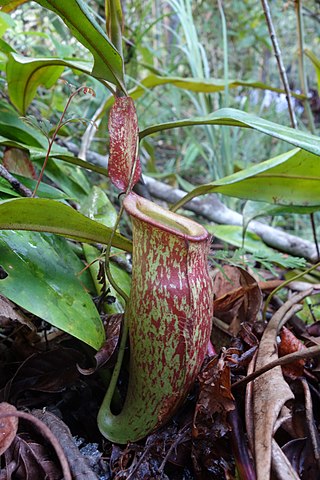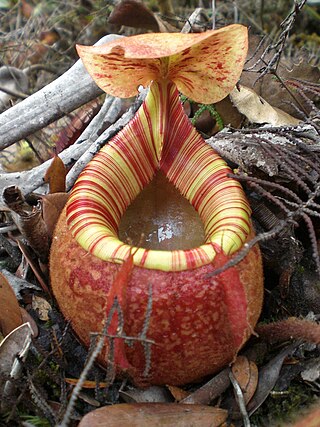
Nepenthes albomarginata is a tropical pitcher plant native to Borneo, Peninsular Malaysia, and Sumatra.

Nepenthes macrovulgaris, or the serpentine pitcher-plant, is a tropical pitcher plant endemic to Borneo. It is a lowland plant that typically grows at altitudes ranging from 300 to 1200 m in sub-montane forest clearings and mossy forest. Its range is restricted to ultramafic habitats, including Mount Kinabalu, Mount Tambuyukon, the Danum Valley, the Tawai Range, the Meliau Range and Mount Silam, all in Sabah, Malaysian Borneo. Pitchers grow to around 25 cm high and range in colour from green to brown, with the speckled form being the most common.

Nepenthes campanulata, the bell-shaped pitcher-plant, is a tropical pitcher plant native to Borneo. It has also been reported from Palawan, the Philippines, though further field work is needed to confirm this identification.

Nepenthes bongso is a tropical pitcher plant endemic to Sumatra, where it has an altitudinal distribution of 1000–2700 m above sea level. The specific epithet bongso refers to the Indonesian legend of Putri Bungsu, the spirit guardian of Mount Marapi.

Nepenthes glandulifera is a species of pitcher plant endemic to the Hose Mountains of central Sarawak. This plant is so named for the black speckles around the petioles. The species's discoverer, Ch'ien Lee, initially thought they were a sign of disease. After further investigation, it was realised that the black speckles were actually nectar glands. The species is also notable for having a very prominent indumentum. It appears to be closely related to N. pilosa. Nepenthes glandulifera is not known to form natural hybrids with any other species.

Nepenthes vogelii is a tropical pitcher plant endemic to Borneo. It is thought to be most closely related to N. fusca.

Nepenthes platychila is a tropical pitcher plant endemic to the Hose Mountains of central Sarawak. It is notable for its smooth peristome and funnel-shaped upper pitchers. Nepenthes platychila belongs to the loosely defined "N. maxima complex", which also includes, among other species, N. boschiana, N. chaniana, N. epiphytica, N. eymae, N. faizaliana, N. fusca, N. klossii, N. maxima, N. stenophylla, and N. vogelii.

Nepenthes rhombicaulis is a tropical pitcher plant endemic to Sumatra. The specific epithet rhombicaulis is formed from the Latin words rhombicus, meaning "rhomboid", and caulis, "stem". It refers to the cross-sectional shape of the stem internodes.
Nepenthes lavicola is a tropical pitcher plant species endemic to the Geureudong Massif of Aceh, northern Sumatra, where it grows at 2000–2600 m above sea level. It is thought to be most closely related to N. singalana and N. spectabilis.

Nepenthes × hookeriana, or Hooker's pitcher-plant, is a common natural hybrid involving N. ampullaria and N. rafflesiana. It was originally described as a species.

Nepenthes × trichocarpa, the dainty pitcher-Plant, is a common natural hybrid involving N. ampullaria and N. gracilis. It was originally thought to be a distinct species and was described as such.

Nepenthes × pyriformis is a natural hybrid involving N. inermis and N. talangensis. It is known only from Mount Talang in Sumatra, to which N. talangensis is endemic. Nepenthes talangensis was only described as a distinct species in 1994. Prior to this it was placed within N. bongso and some of the older literature identifies this hybrid as N. bongso × N. inermis.

Nepenthes × kuchingensis is a natural hybrid between N. ampullaria and N. mirabilis. Although it is named after the city of Kuching in Sarawak, this plant has a wide distribution across Borneo, New Guinea, Peninsular Malaysia, Sumatra, and Thailand.

Nepenthes × sharifah-hapsahii is a natural hybrid between N. gracilis and N. mirabilis. It has been recorded from Borneo, Peninsular Malaysia, Sumatra, and Thailand, although it was originally described as a species endemic to Peninsular Malaysia, where it was said to grow at elevations below 1000 m.

Nepenthes peltata is a tropical pitcher plant known only from the upper slopes of Mount Hamiguitan on the island of Mindanao in the Philippines. It is characterised by a peltate tendril attachment and conspicuous indumentum. The species typically produces ovoid pitchers with a prominent basal crest and large nectar glands on the lower surface of the lid.

Nepenthes nigra is a tropical pitcher plant known from a number of mountains across Central Sulawesi, where it grows at elevations of 1,500–2,700 m (4,900–8,900 ft) above sea level. The specific epithet nigra refers to the dark colouration of the pitchers and stem. The species is closely related to N. hamata and N. tentaculata.
Stewart Robin McPherson is a British geographer, field biologist, nature photographer, and writer.

Alastair S. Robinson is a taxonomist and field botanist specialising in the carnivorous plant genus Nepenthes, for which he is regarded as a world authority. He is currently Manager Biodiversity Services at the National Herbarium of Victoria, Royal Botanic Gardens Melbourne, where he oversees identification botany services, the Library and Artwork components of the State Botanical Collection, and the botanical journal Muelleria, a peer-reviewed scientific journal on botany published by the Royal Botanic Gardens Victoria, for which he is Editor in Chief.

















